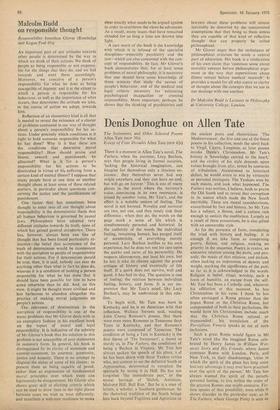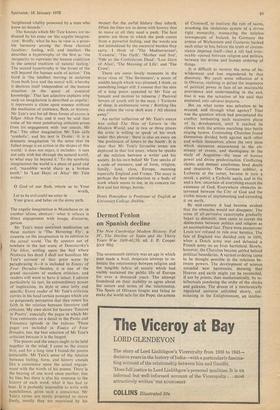Denis Donoghue on Allen Tate
Essays of Four Decades Allen Tate (oup 42s) There is a moment in Allen Tate's novel, The Fathers, when the narrator, Lacy Buchan, says that people living in formal societies, `lacking the historical imagination, can imagine for themselves only a timeless ex- istence: they themselves never had any origin anywhere and they can have no end, but will go on forever.' This is one of many places in the novel where the narrator's voice, convincing in its own resonance, is joined by another voice, Mr Tate's, and the effect is a notable unison of feeling. The novel is not harmed. Novelist and narrator are two, not one, and they rarely sink their difference: when they do, the words on the page mark a sense of life which is simultaneously personal and historical. In ,.the authority of the words the individual feeling, remaining human, has purged itself of eccentricity, of everything merely personal. Lacy Buchan testifies to his own experience, but he does not rest his case upon the quirks and ,turns of his personality. He respects idiosyncrasy, not least his own, but he lets it take its chance against the grand critique of history and eventually of life itself. If a quirk does not survive, well and -good, it has had its day. The question is one of feeling; the relation between individual feeling, history, and form. It is my im- pression that Mr Tate's mind, like Lacy Buchan's, may be understood in this rela- tion.
To begin with, Mr Tate was born in Kentucky and he, is an American with that inflection. Wallace Stevens said, reading John Crowe Ransom's poems, that there were even more Ransoms in Tennessee than Tates in Kentucky, and that Ransom's poems were composed of Tennessee. The condition of being a Tate in Kentucky is the first theme of 'The Swimmers'; a theme as sturdy as, in The Fathers, the conditions of being a Buchan in Virginia. Mr Tate has always spoken the speech of his place, a.,c1 he has been sharp with those Yankee critics who, not content to see the defeated South at Appomattox, determined to complete the spectacle by seeing it in Hell. He has not forgotten 'the immoderate past,' or the moral heritage of 'Shiloh, Antietam, Malvern Hill, Bull Run.' But he is a man of letters, a scholar, a Southern gentleman. So the rhetorical tradition of the South brings him back beyond Fugitives and Agrarians to the ancient poets and rhetoricians. 'The Mediterranean', the first and one of the finest poems in his collection, sends the spirit back to Virgil, Cicero, Longinus, as later poems invoke Dante's Christendom. Mr Tate's history is 'knowledge carried to the heart,' and the civility of his style depends upon values brought from afar, tested by centuries of tribulation. Accustomed to historical defeat, he would scorn to win by virtuosity or personal stratagem. The Yankees won by such means, and look what happened. The Fathers was written, I believe, both to praise the Old South and to reveal that corruption in its source which made the New South inevitable. These are moral considerations, exacerbated by fact and history. So Mr Tate has a subject, a theme, and a culture rich enough to sustain the meditation. Largely as a result of these possessions, he is also gifted with an answerable style.
As for the presence of form, completing the triad with history and feeling: it is enough if we take form as comprising poetry, fiction, and religion, making no priority in the sequence. Poetry is syntax, an executive relation among the parts; and pro- sody, the music of that relation; and diction, often making an impression of density and weight, marking the significance of the past, so far as it is acknowledged in the words. Religion is belief, ritual, worship, each, a form of humility, an escape from the self. Mr Tate has been a Catholic and, whatever his affiliation at this moment, he has Christendom in his veins. I think he has often envisaged a Rome greater than the pagan Rome or the Christian Rome, but compounded of both in their perfections. He would have his Christendom include much that the Christian Rome refuted or transcended: his translation of the Pervigilium .Veneris speaks to me of such inclusions.
Such a great Rome would figure in Mr Tate's mind like the imagined Rome cele- brated by Henry James in William Wet- more Story and His Friends; where James contrasts Rome with London, Paris, and New York, to their disadvantage, 'cities in which the spirit of the place has long since lost any advantage it may ever have practised over the spirit of the person.' Mr Tate has always wanted the spirit of the person, personal feeling, to live within the order of the greatest Romes one might conceive. Fic- tion speaks of that possibility, even while it shows disorder in the particular case; as in The Fathers, where George Posey is seen as
'heightened vitality possessed by a man who knew no bounds.'
The bounds which Mr Tate knows are in- dicated by his essay on 'the angelic imagina- tion'. Briefly, what he has in view is a possi- ble harmony among the three classical faculties: feeling, will, and intellect. He describes a hypertrophy •of the first as 'the incapacity to represent the human condition in the central tradition of natural feeling.' The second hypertrophy is 'the thrust of the will beyond the human scale of action.' The third is 'the intellect moving in isolation from both love and the moral will, whereby it declares itself independent of the human situation in the quest of essential knowledge.' That last adjective explains why such an imagination is described as angelic: it represents a claim upon essence without the mediation of existence, flesh, or history. Mr Tate's text for all three forms of excess is Edgar Allan Poe, and it may be said that some of his most penetrating criticism arises from his engagement with 'our cousin, Mr Poe.' The other imagination Mr Tate calls 'symbolic', and his text is Dante: it is a dramatic imagination 'in the sense that its fullest image is an action in the shapes of this world : it does not reject, it includes: it sees not only with but through the natural world, to what may lie beyond it.' To the symbolic imagination the world is a place of good and evil, 'mandible world sharp as a broken tooth.' In 'Last Days of Alice' Mr Tate writes:
O God of our flesh, return us to Your
wrath, Let us be evil could we enter in Your grace, and falter on the stony path.
The angelic imagination is Manichean or, in another idiom, abstract: what it refuses is direct engagement with image, discourse, person.
Mr Tate's most sustained meditation on these matters is 'The Hovering Fly', a causerie on the imagination in its relation to the actual world. The fly appears out of nowhere in the last scene of Dostoievsky's The Idiot, settling upon the bed where Nastasya lies dead. I shall not humiliate Mr Tate's account of that great scene by paraphrasing it—it is included in Essays of Four Decades—besides, it is one of the grand occasions of modern criticism, and readers will want to have it intact. I admire particularly its tact, its extraordinary power of implication, its style at once lofty and specific. Every reader of Mr Tate's criticism carries in his head certain passages which are so gorgeously perceptive that they renew his faith in the relation between literature and criticism. My own short list favours 'Tension in Poetry', especially the pages in which Mr Tate comments on a detail in the Paolo and Francesca episode in the Inferno. These pages are included in Essays of Four Decades, too, the best selection of Mr Tate's criticism because it is the largest.
The poems and the essays ought to be held together in the mind. I came to the essays first, and for a long time I found, the poems intractable. Mr Tate's sense of the relation between feeling, form, and history attends like a conscience upon the actual engage- ment with the Words of his poems. There is the bearing of one word upon another, line by line, but there is also his response to the history of each word, what it has had to bear. It is probably impossible to write with nonchalance, given such a conscience. Mr Tate's verses are rarely prepared to move freely, mostly they are restrained by his respect for the awful history they inherit. Often the lines are so dense with history that to move at all they need a push. The best poems are those in which the push comes from a powerful feeling, and the words are not intimidated by the ancestral burden they carry. 1 think of 'The Mediterranean', 'Causerie', 'The Oath'. 'Mother and Son', 'Ode to the Confederate Dead', 'Last Days of Alice', 'The Meaning of Life', and 'The Cross'.
There are some lovely moments in the terza rima of 'The Swimmers', a poem of middle length which•was planned, I think, as something longer still. I assume that the idea of a long poem appealed to Mr Tate as 'conceit and motion to rehearse / Pastoral terrors of youth still in the man, / Torsions of sleep, in emblematic verse / Rattling like dice unless the verse shall scan / All chance away.'
An earlier collection of Mr Tate's essays was called The Man of Letters in the Modern World, and in two or three places the critic is willing to speak of his work under this phrase: there is also an essay on 'the profession of letters in the South'. It is clear that Mr Tate's favourite terms are deployed in that last essay, where he speaks of the relation between a writer and his society. In his own behalf Mr Tate speaks of a code of manners, and of form, religion, family, land, class, Europe, meaning especially England and France. The essay is perhaps the best introduction to a body of work which seems to me, in its concern for first and last things, heroic.
Denis Donoghue is Professor of English at University College, Dublin.











































 Previous page
Previous page